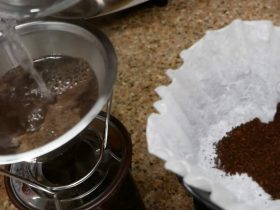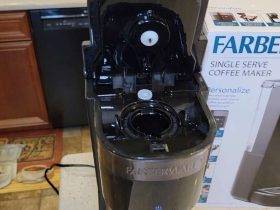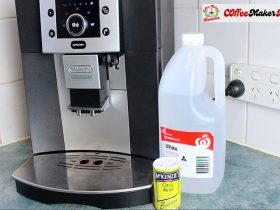Dentures are artificial teeth that can replace missing natural teeth, helping individuals regain their ability to eat and speak properly. While wearing dentures, many people wonder if they can still enjoy their favorite foods and drinks, such as coffee. Coffee is a popular beverage worldwide, known for its aroma and flavor. However, for denture wearers, drinking coffee can be a cause for concern. In this article, we will explore the question of whether Can you drink coffee with dentures, and provide some tips on how to enjoy your coffee without damaging your dentures.
Possible dangers of drinking coffee while wearing dentures
While drinking coffee generally has numerous positive health effects, those who wear dentures should be aware that there may be a few potential hazards. The heat from the hot coffee might create discomfort and suffering in your mouth if your dentures are worn and poorly fitted. The heat from the hot coffee might make your mouth hurt and uncomfortable. Additionally, if dentures are not frequently cleaned, drinking hot coffee while wearing them could cause them to bend or become damaged over time from the heat. In order to avoid any unpleasant surprises, it is crucial to make sure your dentures fit well before ingesting hot liquids.
Consuming coffee while wearing dentures presents another possible risk since the acidic and sugary components of the beverage may cause the acrylic material to expand, which could make the dentures feel loose. When this occurs, it’s possible that your dentures won’t fit securely or correctly, which might cause problems when speaking or eating.
You can drink coffee with wearing dentures, but you should be careful how much you consume and make sure to clean them frequently.
Tips for reducing the effect of coffee on dentures
Many people enjoy a hot cup of coffee in the morning, but for those who wear dentures, the enjoyment might not last as long. One should think about drinking their coffee through a straw to lessen the impact on their dentures. Indirect contact between your drink and gums will be reduced as a result. In order to keep your mouth moistened, it’s also recommended to sip some water or rinse your mouth out with water as you enjoy your coffee.
It’s also advised, if at all possible, to consume the beverage fast because the longer and more frequently sugar and acid from foods and beverages are exposed to teeth and gums, the greater the probability of adverse consequences. Finally, maintaining healthy smiling requires routine dental appointments so that any problems brought on by excessive coffee consumption can be found sooner rather than later.
How to drink coffee without risking your dentures:
If you are a denture wearer and enjoy drinking coffee, there are a few steps you can take to reduce the risks associated with coffee consumption. Here are some tips on how to drink coffee without risking your dentures:
Use a straw: Using a straw to drink coffee can help minimize contact with your dentures and reduce the risk of staining. Be sure to use a straw that is long enough to reach the bottom of your cup, so you can avoid tipping the cup too far and spilling the hot liquid.
Rinse your mouth: After drinking coffee, rinse your mouth with water to help remove any staining substances and to keep your mouth hydrated. This can also help to reduce the risk of dry mouth.
Wait for the coffee to cool: To avoid warping or damaging your dentures, wait for your coffee to cool before drinking it. Drinking hot liquids can cause your dentures to warp or lose their shape, which can lead to discomfort and difficulty chewing.
Be mindful of the adhesive: Drinking hot liquids can weaken the adhesive that holds your dentures in place. To prevent your dentures from becoming dislodged, be careful when drinking hot liquids and avoid drinking them too quickly.
Clean your dentures regularly: To keep your dentures in good condition, clean them regularly with a denture cleaner and brush. This can help to prevent staining and keep them looking and feeling their best.
with these simple tips, you can enjoy your coffee without risking your dentures. By taking a few precautions and being mindful of the potential risks, you can continue to enjoy your favorite beverages and maintain good oral health.
Cleaning your dentures after drinking any beverages
No matter what kind of beverage you consume, it’s crucial to properly clean your dentures afterward. By doing this, you’ll be able to get rid of any leftover food particles, bacteria, or stains that can later cause your dentures to discolor or develop other problems.

After drinking coffee, clean your dentures with a soft-bristled toothbrush and gentle dish soap or detergent that isn’t bleached or abrasive. Rinse the denture in lukewarm water after carefully brushing it with the solution for about two minutes. Finish by completely drying them with a soft cloth, then repeat as necessary to get rid of any last traces of residue. It’s also advised to soak your dentures in a cleaning solution overnight to maintain them clean and clear of bacteria.
You may drink coffee without risking the health and quality of your dentures by following these easy instructions. Your dentures should endure for many years if you take good care of them.
How much coffee do you drink while wearing dentures? Observe its benefits
For people who wear dentures, it is generally safe to drink coffee. However, there are a few things to keep in mind. First, coffee can stain dentures over time, so it’s important to clean them regularly. Second, hot liquids like coffee can warp or damage dentures if they are not properly made or fitted.
In terms of benefits, drinking coffee in moderation can provide a number of health benefits, including increased alertness, improved mood, and a reduced risk of certain diseases such as Parkinson’s disease and liver cancer. However, excessive coffee consumption can also have negative effects on the body, such as causing jitters, anxiety, and digestive issues.
If you wear dentures, it’s important to make sure they are properly fitted and maintained to ensure optimal function and comfort while drinking coffee or other liquids. Consult with your dentist for advice on denture care and maintenance, as well as guidance on safe food and drink consumption with dentures.
Conclusion
Drinking coffee with dentures is generally safe as long as the dentures are properly made, fitted, and maintained. However, it is important to keep in mind that coffee can stain dentures over time and hot liquids can potentially warp or damage them if not handled properly. Additionally, it is important to drink coffee in moderation to reap its potential health benefits without experiencing negative side effects. As always, it’s best to consult with your dentist for guidance on denture care and maintenance and to ensure that you are taking the necessary precautions while enjoying your coffee.
Frequently Asked Questions
Can you drink tea and coffee with dentures?
Yes, it is generally safe to drink tea and coffee with dentures as long as they are properly fitted and maintained. However, it’s important to be mindful of the temperature of the beverages as hot liquids can potentially warp or damage dentures if not handled properly. Additionally, coffee and tea can stain dentures over time, so it’s important to clean them regularly to maintain their appearance.
How do you drink with dentures?
To drink with dentures, make sure they are properly fitted and maintained. Take small sips and use a straw if possible to avoid tipping the liquid too quickly. Be mindful of the temperature of the beverage as hot liquids can potentially warp or damage dentures if not handled properly. Clean your dentures regularly to maintain their function and appearance.
Can you eat ice cream with dentures?
eat foods that are straightforward to chew and swallow. Eggs, salmon, cheese, diced meat, prepared veggies, and ice cream are a few examples. Small bites and thorough chewing are vital; take care not to use your front teeth as a bite force.














Leave a Reply